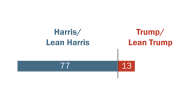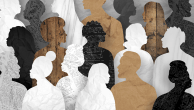The controversy over the death of Trayvon Martin has highlighted issues relating to the treatment of blacks by local police departments, the state of race relations in the U.S. and press coverage of African Americans. Pew Research Center surveys in recent years have covered the opinions of blacks and whites on these and other issues.
A 2009 survey by Pew Social Demographic Trends found that blacks had far less confidence than whites in their local police in a
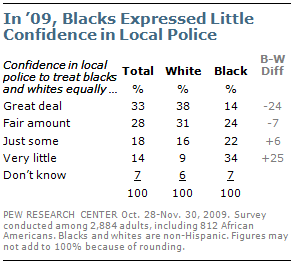
number of areas, including their treatment of racial groups.
Just 14% of African Americans said they had a great deal of confidence in local police officers to treat blacks and whites equally. More than twice as many whites (38%) had a great deal of confidence in the local police to provide equal treatment. More than three times as many blacks as whites said they had very little confidence in their local police to treat the races equally (34% vs. 9%). Blacks’ confidence in local police to provide equal treatment was little changed from 2007 or 1995.
Yet that survey showed that African Americans had a positive overall assessment of the state of race relations. About three-quarters of African Americans (76%) said blacks and whites got along “very well” or “pretty well.” Majorities of both blacks (60%) and whites (70%) said that the values of the two groups had gotten more similar over the previous 10 years.
And in the wake of Barack Obama’s election as president, there was a sharp rise in perceptions of black progress. Nearly four-in-ten African Americans (39%) said that the “situation of black people in this country” was better than it had been five years earlier. In 2007, just 20% said the condition of blacks had improved in the previous five years.
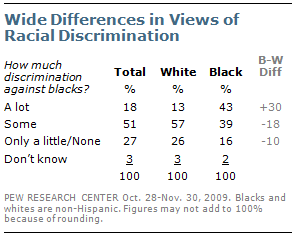
Blacks’ concerns over racial discrimination had not decreased, however. More than four-in-ten (43%) African Americans said that there is a lot of discrimination against blacks, compared with just 13% of whites. Whites were more likely to say that Hispanics than blacks faced a lot of discrimination (21% vs. 13%).
Fully 81% of African Americans said “our country needs to continue making changes to give blacks equal rights with whites.” Just 36% of whites agreed, while a majority (54%) said “our country has made the changes needed to give blacks equal rights with whites.”
News Coverage of Blacks
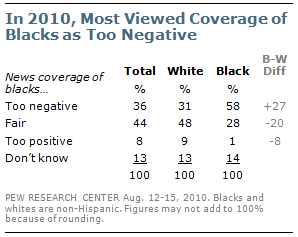
A 2010 study by the Pew Research Center found that African Americans were highly critical of news coverage of blacks. Nearly six-in-ten (58%) said that coverage of blacks was too negative. Just half as many (29%) said coverage was either fair (28%) or too positive (1%).
By contrast, nearly half (48%) of whites said that coverage of blacks was generally fair. Just 31% of whites thought that news coverage of blacks was too negative.
That survey also found that blacks were far more likely than whites to say that the news media devoted too little coverage to race relations. About half of African Americans (51%) said the subject of race relations received too little coverage, compared with just 24% of whites.
However, there were smaller differences between blacks and whites in views of the accuracy of news coverage of race relations. Pluralities of both whites (50%) and blacks (42%) said that coverage of race relations make them out to be worse than they actually are. Smaller percentages said coverage presented race relations as better than they really are (16% of whites, 23% of blacks) or about as they really are (23% of whites, 26% of blacks).
The Martin Case: News Interest and Coverage
The Pew Research Center’s most recent News Interest Index, conducted March 22-25 among 1,003 adults, found that Trayvon Martin’s death was the public’s top news story. African Americans were more than twice as likely as whites to say that this was their top story (52% vs. 20%).
On March 30, the Pew Research Center’s Project for Excellence in Journalism released a report showing the very different ways that cable TV news outlets and talk radio, blogs and Twitter have covered and analyzed the Trayvon Martin story. It found that Twitter interest in the Martin story did not surge until March 17, three weeks after the teenager’s death. (For more, see “How Blogs, Twitter and Mainstream Media Have Handled the Trayvon Martin Case.”)


